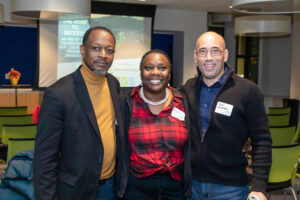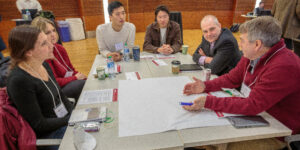Channel Partners
July 24, 2023—In early 2022, the Wells Fargo Innovation Incubator (IN²) chose seven winners for its sixth Channel Partner Strategic Awards cycle. This funding addresses gaps in the cleantech ecosystem and aims to eliminate barriers startups face on the road to commercialization.
Many awardees focused on improving diversity, equity, and inclusion support, thereby driving significant change for underserved communities often most affected by climate change. This community is just as essential as any other to the energy transition because for it to work, it must be everyone. Here is the story of how two of the winners used their awards and the impact they made in just one year:
Browning the Green Space
When Browning the Green Space (BGS) Executive Director Kerry Bowie used to go to cleantech and energy conferences, he could count the Black and Brown people on one hand, even though there were thousands of attendees. That is why he co-founded BGS.
“How do we get more underrepresented groups—African Americans, Latinx, and indigenous communities—into the green space?” Bowie asked. “We’re not trying to address one piece of the picture. We’re looking to tackle the big picture, and we’ve already started to do it.”
To that end, BGS used its IN2 Channel Partner award to create the Accelerating Contractors of Color in Energy for Sustainable Success (ACCESS) program. The goal is to support more Black and Brown entrepreneurs in establishing their own contracting businesses and securing work with clean energy developers and project managers.

December 14, 2022. Boston, MA.
End of year celebration for graduates from the Browning the Green Space ACCESS program and Emerald Cities Collaborative E-Contractor Academy. The event included final presentations from the program participants as well as open networking and social time. Barr Foundation.
© 2022 Marilyn Humphries
“In talking to a lot of these companies and their people,” Bowie said. “We realize there’s a perceived gap in the supplier diversity side. They tell us: ‘We can’t find contractors of color to do this work.’”
To overcome this challenge, ACCESS runs an 8-week program that offers a crash course in entrepreneurship to support the development of minority-owned startups, similar to Energy I-Corps. Bowie believes seeding the growth of new businesses owned by individuals from diverse communities will be more effective long-term in getting these clean energy solutions into the hands of communities most impacted by the effects of climate change.
“People who grew up in housing projects in Roxbury or Mattapan are more apt to engage their neighbors and reach back to lift others up,” he said. “Minority-owned businesses are more likely to hire from communities of color. That’s how we get this technology to the people who need it the most.”
About half of the 14 people who completed the first program already have their own companies or started one. A few of the graduates also worked together to create their own LLC.
“ACCESS is about customer discovery and developing a business model,” Hadas Webb, deputy director of BGS, said. “We also help folks learn the nitty gritty like how to incorporate and what insurance to get. We are building a resource board so we can continue to facilitate teaming and partnership as participants get their businesses off the ground.”
The program is funded for at least two more years, but BGS wants to keep it going beyond that.
“Seeing what we’ve been able to do and being able to point to the progress will make it easier for us to continue,” Bowie said. “We should be able to support more companies and potentially expand beyond Massachusetts. Someday we’d love to help budding entrepreneurs in New York, Rhode Island, New Jersey, Maryland, and even farther across the country.”
BGS credits the IN2 Channel Partner network for giving them the opportunity to receive this type of funding. Bowie hopes the connection creates additional pathways for the future.
“If we can support other Channel Partners that are complementary to what we are doing, it’s great,” he said. “I’m so happy to share everything we’re doing. That’s what a network is about, being connected.”
Wisconsin Energy Institute
Home to the Great Lakes Bioenergy Research Center, the Wisconsin Energy Institute used its IN2 2022 Channel Partner award to build place-based connections in the local bioeconomy ecosystem through a series of workshops.
“We focused on three areas we see as emerging and actionable,” Mary Blanchard, associate director of the Wisconsin Energy Institute, said. “These include renewable natural gas, carbon management, and sustainable aviation fuels. We designed our workshops to identify gaps and opportunities in those fields, and we tailored them to appeal to local audiences.”

Troy Runge (right), UW–Madison professor in biological systems engineering, leads a brainstorming session with other researchers at the Great Lakes Bioenergy Research Center during the Wisconsin Energy Institute’s Sustainable Aviation Fuels and Biobased Chemicals Workshop held in the Discovery Building on the the University of Wisconsin–Madison campus on Feb. 2, 2023. (Photo by Matthew Wisniewski / Wisconsin Energy Institute)
For example, with the high number of dairy cows in Wisconsin, a tremendous amount of manure is available as feedstock for anaerobic digestion. In this process, microbes convert the waste to biogas. Further processing purifies the biogas into renewable natural gas, which can be injected into the pipeline for distribution and use instead of fossil-based natural gas. Increasing the production of renewable natural gas can help keep excess manure off farm fields where its runoff can contaminate surface and groundwater.
Similarly, the carbon management workshops examined how farmers, foresters, and some industries can capture, utilize or sequester more carbon in the soil, plants, products, or even underground and how to access more carbon credits. For sustainable aviation fuels, workshops presented many technologies that convert biobased feedstocks into fuels and other products and how fuel refiners are now putting steel in the ground to build refineries.
“When we say actionable, it means: How can I be a part of this right now?” Blanchard said. “We’re creating opportunities at these workshops for people to meet each other and talk about their areas of expertise. People are working on this right now—there is money being invested right now.”
Once the workshops are complete, Blanchard wants the program to keep going. She believes these vital conversations leverage the expertise at the Wisconsin Energy Institute in a beneficial way and that stakeholders benefit from shared understanding and increased networking connections.
“We really would like them to continue,” she said, “because we care about the bioeconomy and all it offers a lot for Wisconsin, given the state’s abundant agricultural and forestry activities. We think the program has numerous benefits for Wisconsin, and the community will benefit if we can maintain this effort.”
Blanchard credits the IN2 Channel Partner network for its support and hopes to use the expertise in the future.
“The range of expertise that’s part of this network amazes me,” she said. “Knowing there are experts around the country who can help our startups is reassuring. We’re learning from each other, and the network provides that opportunity.”
